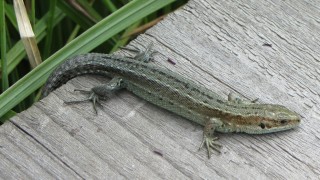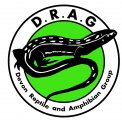About us
About Us
Welcome to the Devon Reptile and Amphibian Group (DRAG) website.

Who are we?
We are a friendly, volunteer led group who have a passion for reptiles and amphibians and a willingness to share this passion, knowledge and experience with others.
We are made up of individuals with a variety of backgrounds and interests, from those with a general interest in the natural world to experienced herpetologists, ecologists and conservationists.
What do we hope to achieve?
Here are some of the group’s key aims and objectives:
- To identify and protect important reptile and amphibian sites in the county of Devon
- To support partner groups and organisations in conserving these sites
- To better understand species distributions, populations and potential negative trends and to help mitigate or reverse those trends
- To promote conservation through education and public engagement
- To collect and submit data to Devon Biodiversity Records Centre (DBRC)
How do we achieve this?
- Through monitoring and surveying of known sites
- Through visiting potential sites of interest
- By working along with landowners and organisations in providing advice and consultations on habitat management and species monitoring
- By encouraging everyone to report sightings of reptiles and amphibians on Record Pool either using the Devon Reptile and Amphibian Group (DRAG) website (under the 'Record a sighting' tab) or by visiting https://www.recordpool.org.uk.
- By holding events and by providing resources that aim to raise awareness and educate people about these amazing animals and their habitats
- By recruiting more members
News
News
At last, the reptile survey season has begun!
After an exceptionally long wait for spring to arrive, keen DRAG volunteers Phil and Andrea Clinch, Kim Leaver and the Conservation Officer for Clinton Estates found a good number of reptiles in the East Devon area on Sunday 21st April. 15 slow worms, six common lizards and one adder were found in one survey despite air temperatures at 10 degrees with a cool breeze. After many cancelled and postponed 'spring' amphibian and reptile surveys we are glad that spring has finally arrived!
If you are interested in joining surveys, events or conducting your own survey (eg reptile survey as part of a college research project), please get in touch!
April great crested newt training courses re-scheduled due to unseasonal weather
Please note that the two April great crested newt training courses have been cancelled and re-scheduled to May due to the unseasonally cold and wet weather. Go to the Events pages for the more information on the courses on the new dates of 11/12 and 18/19 May. The location of the course may also change if the site is flooded. If you have already paid or registered interest for either of the courses, Nicky Green will get get in contact with you directly to update you on the situation.
Sunday 24th March – Reptile survey training day, East Devon, time and location tbc
Dear DRAG friends and members,
Sunday 24th March – Reptile survey training day, East Devon, time and location tbc
Learn how to ID our widespread reptiles, where to find them and what to do with your sightings. The training will be for half a day and will include a classroom session plus field visit. It will particularly useful for friends/members hoping to take part in nature reserve monitoring this summer. Cost £10, to register interest please contact me on email address below. If there is enough demand a second session will be held in north Devon.
At present we have only four people interested in attending this training day. If you are interested in coming please let me know by the end of Friday 15th March. If we do not get at least 12 people the event will be cancelled.
Nicky Green CEnv MIEEM
DRAG Chair
nicky@green-ecology.co.uk
I am running the Plymouth Half Marathon on April 28th 2013 to raise money for Cancer Research in memory of a dear friend and colleague.
Please donate to this worthy cause by visiting www.justgiving.com/Nicky-Green4
DRAG Events update: February to May 2013
Hi all,
Here is some information about some up and coming events – hope you can make them!! Mabel is very busy organising further events for later in the summer which we’ll let you know about asap. There will also be the opportunity to monitor nature reserves – contact me if you’re interested..... This may be ideal for students wanting to do a dissertation on reptiles and/or amphibians or just anyone who is very keen!
Note that some events, indicated, are for DRAG members only. If you want to join DRAG, (it's free!) please contact Kim Leaver, Database Manager, on membership-drag@hotmail.co.uk.
Events update:
- February – March – Toad Patrols
Unfortunately we don’t have a patrol coordinator this year but there are several active patrols in Devon being co-ordinated by Froglife www.froglife.org.uk If you want to help out with a patrol or start your own please contact them. Please report any sightings of toads on roads to Froglife and Ellie at DBRC eknott@devonwildlifetrust.org - Sunday 3rd March – ARG Regional Conference, Cornwall College, Newquay
Your very last chance to book this – please contact Mark Nicholson nicholsonmark60@yahoo.com asap if you want to attend. - Mid-March - Adder and nature reserve walk for DRAG members only.
- Sunday 24th March – Reptile survey training day, East Devon, time and location tbc
Learn how to ID our widespread reptiles, where to find them and what to do with your sightings. The training will be for half a day and will include a classroom session plus field visit. It will particularly useful for members hoping to take part in nature reserve monitoring this summer. Cost £10, to register interest please contact me. If there is enough demand a second session will be held in north Devon. - Sat/Sun 13th/14th April - GCN training course, Braunton Burrows
Only 4 places left on this course – please book (with me) asap if you’re interested. Course joining information will be sent in early March. All profits donated to DRAG. - Sat/Sun 20th/21st April - GCN training course, Braunton Burrows
There are several places left on this course – as above please book asap. - Early-May - Sand lizard walk and NARRS survey for DRAG members only.
Best wishes
Nicky Green
DRAG Chair
nicky@green-ecology.co.uk
Slime “mystery” solved, almost...
Here's a bit of amphibian news below. Watch this space for 'slime' test results....
Cheers
Mabel
"RSPB welcomes public response to call for information on the appearance of strange “jelly-like” substance at its Ham Wall Nature reserve in Somerset
Following yesterday’s appeal for information about a strange jelly like substance that has appeared at its Ham Wall nature reserve in Somerset the RSPB has received a number of theories about its origin.
Tony Whitehead, spokesperson for the RSPB in the south west said; “We’ve been delighted by the number of people that have contacted us about the mystery slime.
Many pointed out the sighting of a strange meteor like object over the reserve last week [Note 1] captured on film by a local wildlife photographer. However, the majority of people suggested more earthly origins. Some identified it as a slime mould, but by far the commonest was that its appearance was related to amphibian activity.”
The RSPB was contacted by Peter Green a Devonshire vet who works with wildlife, who gave a particularly logical and simple explanation following his own researches.
Tony Whitehead explains: “At this time of year amphibians are spawning. The spawn is held in a substance known as glycoprotein which is stored in the female’s body.
“If the animal is attacked by a predator – herons for instance are fond of the occasional frog – it will quite naturally drop its spawn and the associated glycoprotein. This is designed to swell on contact with water, which gives the gelatinous mass we are all familiar with in frog spawn. However, if it’s unfertilized, it is just the empty glycoprotein that is dropped – which on contact with moist ground will swell and give a clear slime like substance.”
“While this is our favoured explanation for this appearance of slime, it’s also worth remembering that other things can give a similar appearance. Certain slime moulds can. So can the wonderfully named crystal brain fungus, but this only appears on wood. And as mentioned yesterday, certain algae, and blue-green algae can also appear as a clear slime”
Tony Whitehead, RSPB South West
Resources
Resources
Introduction to Reptile Identification and Surveying
Adder Bites - Helpful Links
Dogs and Adders
Dogs 'n' Adders - Information Leaflet
Snakes in Gardens
Snakes are fascinating creatures and for many, finding one in the garden is a real treat and a memorable experience.
However, for many others this can be a disconcerting and even worrying situation. This can be as a result of misunderstandings often fed by negative and often inaccurate media reports and rumours. Please be assured, though, that there is no reason to worry and that these situations can be resolved fairly easily.
The vast majority of reported snake sightings in gardens turn out to be either a Grass Snake or a Slow worm (a legless lizard which resembles a snake). Both species are harmless and are best left alone.
We only have one venomous snake species, the Adder, which is rarely found in gardens unless your property is situated close to favourable habitat. Even then, the adder is a very shy animal and avoids human activity whenever it can. Again, the best course of action is to leave it alone and allow it to move off when it’s ready. The likelihood is that it is just passing through anyway.
Occasionally, DRAG gets asked about relocating snakes. For all kinds of practical reasons this isn’t something we would do and would actually be the opposite of what our group encourages which is reptile conservation.
The best recommendation we can provide is to learn as much as possible about the reptile you have seen in your garden. We will happily help you identify it and provide related advice such as understanding which features of your garden have likely attracted it in the first place.
Please don’t hesitate to get in touch and send a photo or description of the snake to devonrag@hotmail.com or to our Facebook group at http://www.facebook.com/groups/DevonARG/.
It would really help if you could record your sighting on Record Pool either using the Devon Reptile and Amphibian Group (DRAG) website (under the 'Record a sighting' tab) or by visiting https://www.recordpool.org.uk.
Please remember that reptiles are protected under UK law.
Species Guides
Species Guides
Devon's Reptiles
In the UK we have 6 native reptile species, each of which can be found in Devon.
To find out more about a particular species click on it's name which will then jump to the relevant information.
Adder Vipera berus
Grass Snake (or Barred Grass Snake) Natrix helvetica
Smooth Snake Coronella austriaca
Slow Worm Anguis fragilis
Viviparous (or Common) Lizard Zootoca vivipara
Sand Lizard Lacerta agilis
Devon's Amphibians
In the UK we have 7 native amphibian species, 6 of which can be found in Devon.
To find out more about a particular species click on it's name which will then jump to the relevant information.
Great Crested Newt (Triturus cristatus)
Smooth Newt (Lissotriton vulgaris)
Palmate Newt (Lissotriton helveticus)
Common Toad (Bufo bufo)
Natterjack Toad (Epidalea calamita)
Common Frog (Rana temporaria)
For information on the adder please click on the fact sheet link in blue or you can watch the animated video below.
Grass Snake Natrix helvetica
Tadpoles
We've all seen them right, often in large numbers early in the year in even the smallest bodies of water ..... but what are tadpoles?
Tadpoles are the larval stage in the life cycle of an amphibian. In the UK the tadpoles we most often encounter will belong to the Common frog (Rana temporaria) or Common toad (Bufo Bufo).
Amphibians go through several stages before reaching their adult form. This incredible process is known as metamorphosis. Below is a video showing in detail how this process takes place.
Membership
Membership
Why become a member?
Well, big things start in small ways and becoming a member of the Devon Reptile and Amphibian Group (DRAG) is one step you can take towards protecting the reptiles and amphibians in your local area and beyond.
Whether you’re dropping us a line by email, submitting a photo or participating as a volunteer in a reptile or amphibian survey your contribution is valued all the same. Everything we can do to keep the ‘conversation’ going is great for the reptiles and amphibians of Devon.
The more members that join the greater the potential for activity. Put simply, without members we couldn’t do what we do and it would be great to have you join us.
Membership benefits:
- · Become part of a group of like minded individuals and keep in touch via social media or email
- · Invitations to events, training and volunteering opportunities
- · A quarterly newsletter
- · Opportunities to see and work with elusive and hard to find species
- · Opportunities to learn new skills
- · Gain practical experience in conservation
- · The opportunity to have a positive, lasting impact on Devon’s wildlife
Some of the activities that you will be invited to can include talks by local experts, guided walks, bioblitzes and even species identification and survey skills training.
Opportunities for volunteering could include surveying, habitat management or helping out at nature festivals.
Have a voice in what we do.
We value your feedback and encourage it.
For example:
- · Do you have an idea for an event or training?
- · Is there a site near you that we are unaware of?
Drop us a line and let us know at devonrag@hotmail.com.
How do I join?
If you would like to become a member please send your request by email to devonrag@hotmail.com.
FAQ
- · Question: How much does membership cost?
Answer: Membership is free to join.
- · Question: How long will my membership last?
Answer: Currently, membership is on a rolling annual basis.
- · Question: Do I need special knowledge, qualifications or experience to become a member?
Answer: No. There are no prerequisites, nor is there any minimum level of commitment required.
- · Question: Can I be a member but not volunteer?
Answer: Yes. Whilst volunteering makes a big difference to what we do, we totally understand that not everyone’s circumstances allow for it.
- · Question: How do I cancel my membership?
Answer: You can cancel your membership at any time by sending your request to devonrag@hotmail.com.
Photo gallery
Photo Gallery
Contact us
Contact Us
If you want to join DRAG and our email group, or have a general query, please contact a member of DRAG admin:
Please be patient with us, this email address is not checked every day!
Upcoming Events
Upcoming events will be listed here.
Latest News
- A tale of six lizards
25/07/2021 1:49 pm - Upcoming Talk
15/02/2016 3:22 pm - Reptile Training Oppourtunity
28/04/2014 9:40 am - DRAG great crested newt training courses delivers the goods
23/05/2013 10:46 pm - Sand lizard summary and pics
09/05/2013 10:23 pm
© Devon Reptile & Amphibian Group (DRAG)
Website hits: 71297
View All | Find out how to get a mini-website for your ARG
© ARG UK Local Groups mini-websites 2025
Wind powered websites by Aye-aye Design.

